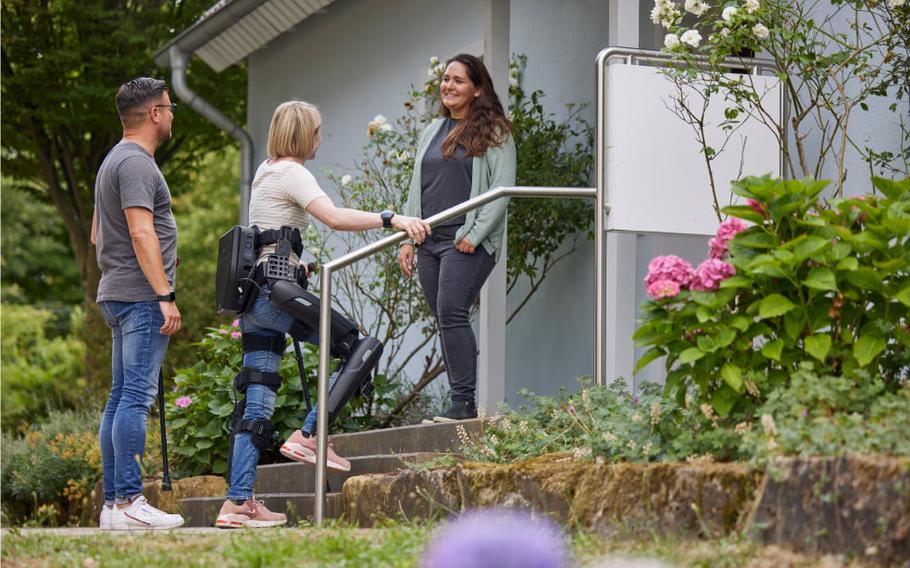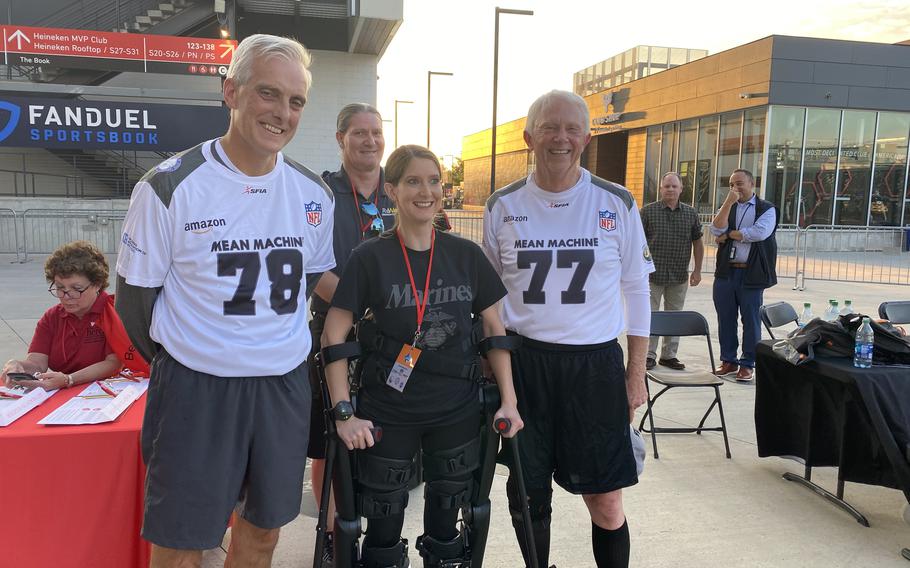
Paralyzed Marine Corps veteran Brittany Elliott testified Thursday, March 21, 2024, to House lawmakers about the need for more veterans to have more acess to exoskeleton devices like the one shown here. The device enabled Elliott to walk again. (Lifeward)
WASHINGTON – Marine Corps veteran Brittany Elliott was paralyzed from the chest down in an auto accident but was able to walk again with a robotic exoskeleton provided to her in a clinical trial sponsored by the Department of Veterans Affairs.
But after three years, a VA doctor determined Elliott no longer qualified for the assistive mobility device and told her to use a wheelchair again.
“Forcing veterans to stay in wheelchairs when assistive mobility devices are available is not acceptable,” Elliott, 34, told lawmakers Thursday in support of the STAND Act during a hearing of the House Veterans’ Affairs Committee’s subpanel on health.
The STAND Act, or the Spinal Trauma Access to New Devices Act, is legislation sponsored by Rep. Jack Bergman, R-Mich., a retired Marine Corps lieutenant general.
“We are systematically failing our veterans by not providing them with rapid access to this technology,” he said at the hearing.
The exoskeleton is available through a prescription at the VA, though Bergman and other lawmakers said veterans often are not informed about the devices by their doctors or evaluated for their eligibility to receive them.
Some lawmakers said reporting requirements and other paperwork that doctors must complete to offer and train patients on the device has discouraged some facilities from offering it.
The STAND Act would mandate annual physicals for paralyzed veterans that would include assessments to receive the exoskeleton, which has been approved by the Food and Drug Administration.
“In my view, this bill is critical to codify what the VA already should be doing at annual medical assessments for veterans. I can tell you firsthand that they are not,” Elliott said.

Brittany Elliott at the congressional football game in 2023. She is pictured with Denis McDonough, secretary of the Department of Veterans Affairs, Rep. Jack Bergman, R-Mich., and her father, Morgan Elliott. (Brittany Elliott)
VA regulations now allow for “powered exoskeletons” as a prescribed medical device that is “placed over a person’s paralyzed or weakened limbs for the purpose of providing ambulation,” according to the department’s clinical protocol issued in 2018.
But Bergman said the legislation is needed to ensure that qualifying veterans can access the devices through their VA providers. A companion bill was introduced Thursday by Sen. Jon Tester, D-Mont., chairman of the Senate Veterans’ Affairs Committee.
Elliott was paralyzed in 2015 when a vehicle operated by a drunken driver ran a red light and hit the car that Elliott was driving near her Tennessee home.
She was a medically discharged veteran at the time, recovering from a broken right femur that she had suffered in basic training at the Marine Corps Recruit Depot on Parris Island, S.C., and preparing to re-enlist.
Roscoe Butler, associate legislative director for the nonprofit veterans group Paralyzed Veterans of America, testified in support of the bill.
He described exoskeletons as “life-changing options for improving functionality and independence.”
The computerized devices are wearable suits equipped with motorized joints, sensors and rechargeable batteries. They range in price from roughly $75,000 to $100,000 with veterans enrolled in VA health care receiving coverage for most of the cost.
Worn over clothes, the exoskeleton suit wraps around an individual’s legs, chest and back.
In Elliott’s case, she initially enrolled in a clinical trial in 2015 to try an exoskeleton. She traveled from her Tennessee home to participate in an eight-week trial at a VA facility in St. Louis, where she was fitted with the device and learned how to use it.
“I took the device home and used it everywhere,” she said.
But when she returned to the St. Louis facility in 2018 for a reassessment, her doctor informed her that she could no longer use the device, Elliott said.
“I was returned to my wheelchair and told to get used to it,” she told lawmakers.
Elliott testified that for the next four years, she – with the help of her father – worked to overturn the decision to take the exoskeleton device away from her.
“I engaged in local and regional battles to get the device back that transformed my life,” she said.
Elliott now advocates and speaks on the behalf of other paralyzed veterans. She said it often is a challenge for veterans who are paralyzed to receive physical exams in a timely manner at local and regional facilities.
In 2022, Elliott and her father traveled to a VA health clinic in Mississippi, where a VA physician agreed to evaluate and equip her with a new exoskeleton.
“It is appalling to me that Brittany Elliott was told to just get used to returning to her wheelchair,” said Rep. Mariannette Miller-Meeks, R-Iowa, a doctor and chairwoman of the House VA subcommittee on health.
Miller-Meeks said she has patients with paralysis and sees the potential and benefits with assistive mobility devices.
“Exoskeletons need to have much more serious consideration and use at the VA to help our veterans become ambulatory,” she said.
Butler said the STAND Act would require the VA to provide annual medical exams for paralyzed veterans. As it is now, access is inconsistent across the nation’s VA clinics and hospitals.
He said the annual check-ups are critical for identifying health problems -- such as urinary tract infections and pressure sores -- before they worsen and cause more serious problems.
“Some VA facilities do an excellent job but not all of them. There is room for improvement,” Butler said.